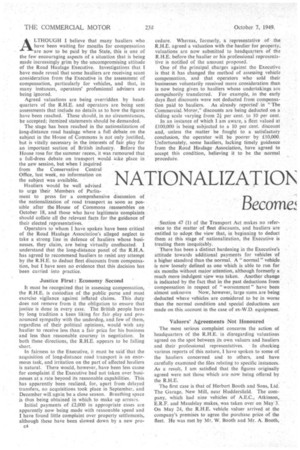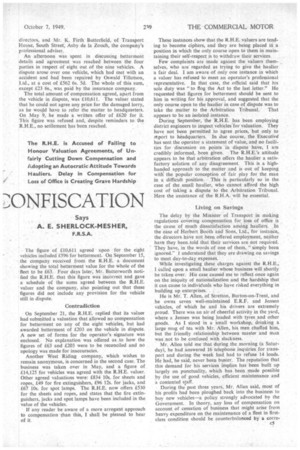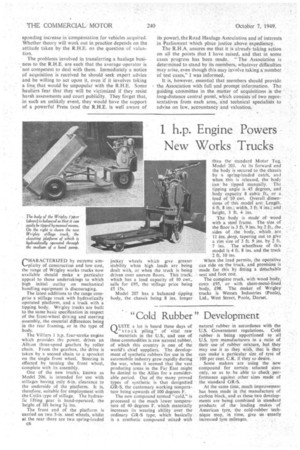NATIONALIZATION
Page 42

Page 43

Page 44

If you've noticed an error in this article please click here to report it so we can fix it.
Become
:IONFISCATION
Says A. E. SHERLOCK-MESHER, F.R.S.A.
ALTHOUGH LTHOUGH I believe that many hauliers who have been waiting for months for compensation are now to be paid by the State, this is one of the few encouraging aspects of a situation that is being made increasingly grim by the uncompromising attitude of the Road Haulage Executive. Investigations that 1 have made reveal that some hauliers are receiving scant consideration from the Executive in the assessment of compensation, particularly for vehicles, and that, in many instances, operators' professional advisers are being ignored.
Agreed valuations are being overridden by headquarters of the R.H.E. and operators are being sent assessments that include no details as to how the figures have been reached. These should, in no circumstances, be accepted; itemized statements should be demanded.
The stage has been reached in the nationalization of long-distance road haulage where a full debate on the subject in the House of Commons is not only justified, but is vitally necessary in the interests of fair play for an important section of British industry. Before the House rose for the summer recess, it was rumoured that a full-dress debate on transport . would-'-:--ake place in the new session, but when I inquired from the Conservative Central Office, last week, no information on the subject wasavailable.
Hauliers would be well advised to urge 'their. Members of Parliament to press for a comprehensive discussion of the nationalization of road transport as soon as possible after the House of Commons reassembles on October IS, and those who have legitimate complaints should collate all the relevant facts for the guidance of their elected representatives.
Operators to whom I have spoken have been critical of the Road Haulage Association's alleged neglect to take a strong line in defence of hauliers whose businesses, they claim, are being virtually confiscated. I understand that the long-distance panel of the R.H.A. has agreed to recommend hauliers to resist any attempt by the R.H.E. to deduct fleet discounts from compensation, but I have seen no evidence that this decision has been carried into practice.
Justice First : Economy Second '
It must be recognized that in assessing compensation, the R.H.E., is custodian of the public purse and must exercise vigilance . against inflated claims. This duty does not remove from it the obligation to ensure that justice is done in every case. The British people have by long tradition a keen liking for .fair play and pronounced sympathy with the underdog, and few of them, regardless of their political opinions, would wish any haulier to receive less than a fair price for his business and less than reasonable courtesy in negotiation. In both these directions, the R.H.E. appears to be falling short.
In fairness to the Executive, it must be said that the acquisition of long-distance road transport is an enormous task, and irritation on the part of affected hauliers is natural. There would, however, have been less cause for complaint if the Executive had not taken over businesses at a rate beyond its reasonable capabilities. This has apparently been realized, for, apart from delayed transfers, no acquisitions took place in September, and December will again be a close season. Breathing space is thus being obtained in which to make up arrears.
Initial payments of £2,000 in appropriate cases are apparently now being made with reasonable speed and I have found little complaint over property settlements, although these have been slowed down by a new pro c4 . cedure. Whereas, formerly, a representative ofthe R.H.E. agreed a valuation with the haulier for property, valuations are now submitted to headquarters of the R.H.E. before the haulier or his professional representative is notified of the amount proposed.
One of the principal charges against the Executive is that it has changed the method of assessing vehicle compensation, and that operators who sold their businesses voluntarily received more consideration than is now being given to hauliers whose undertakings are compulsorily transferred. For example, in the early days fleet discounts were not deducted from compensation paid to hauliers. As already reported. in " The Commercial.Motorrdiscounts are being deducted on a sliding scale varying 'from 2-i per cent. to 10 per cent.
In an instance of which I am aware, a fleet valued at £100,000 is being subjected to a 10 per cent. discount and, 'unless the matter be fought to a satisfactory conclusion, the operator will be poorer by £10,000. Unfortunately, some hauliers, lacking timely guidance from the Road Haulage Association, have agreed to accept this condition, believing it to be the normal procedure.
Section 47 (1) of the Transport Act makes no reference to the matter of fleet discounts, and hauliers are entitled to adopt the view that, in beginning to deduct them at this stage of nationalization, the Executive is treating them inequitably.
There has been a distinct hardening in the Executive's attitude towards additional payments for vehicles of a higher standard than the normal. A " normal " vehicle is now loosely defined as one which is able to run for six months without major attention, although formerly a much more indulgent view was taken. Another change is indicated by the fact that in the past deductions from compensation in respect of " worsenment " have been almost unknown Now, however, large sums are being deducted where vehicles are considered to be in worse than the normal condition and special deductions are made on this account in the case of ex-W.D. equipment.
Valuers' Agreements Not Honoured The most serious complaint concerns the action of headquarters of the R.H.E. in disregarding valuations agreed on the spot between its own valuers and hauliers and their professional representatives. In checking various reports of this nature, I have spoken to some of the hauliers concerned and to others, and have carefully examined the files relating to specific instances. As a result, I am satisfied that the figures originally agreed were not those which are now being offered by the RILE.
The first case is that of Herbert Booth and Sons, Ltd. The Garage, New Mill, near Huddersfield. The company, which had nine vehicles of A.E.C., Atkinson, E.R.F. and Maudslay makes, was taken over on May 3. On May 24, the R.H.E. vehicle valuer arrived at the company's premises to agree the purchase price of the fleet. He was met by Mr. W. Booth and Mr. A. Booth, directors, and Mr. K. Firth Butterfield, of Transport House, South Street, Asby de la Zouch, the company's professional adviser.
An afternoon was spent in discussing betterment details and agreement was reached between the four parties in respect Of eight out of the nine vehicles. A dispute arose over one vehicle, which had met with an accident and had been repaired by Oswald Tillotson, Ltd., at a cost of £562 6s. 5d. The whole of this sum, except £23 6s., was paid by the insurance company.
The total amount of compensation agreed, apart from the vehicle in dispute, was £10,611. The valuer stated that he could not agree any price for the damaged lorry, as he would have to refer the matter to headquarters. On May 9, he made a written offer of £620 for it. This figtire was refused and, despite reminders to the R.H.E., no settlement has been reached.
The figure of £10,611 agreed upon for the eight vehicles included £596 for betterment. On September 15, the company received from the R.H.E. a document showing the total betterment value for the whole of the fleet to be £63. Four days later, Mr. Butterworth notified the R.H.E. that this figure was incorrect and gave a schedule of the sums agreed between the R.H.E. valuer and the company, also pointing out that these figures did not include any provision for the vehicle still in dispute.
Contradiction On September 21, the R.H.E. replied that its valuer had submitted a valuation that allowed no compensation for betterment on any of the eight vehicles, but had awarded betterment of £203 on the vehicle in dispute. A new set of forms for the operator's signature was enclosed. No explanation was offered as to how the figures of £63 and £203 were to be reconciled and no apology was made for inaccuracies.
Another West Riding company, which wishes to remain anonymous, is concerned in the second case. The business was taken over in May, and a figure of £14,125 for vehicles was agreed with the R.H.E. valuer. Other agreed valuations were: £834 10s. for sheets and ropes, £49 for fire extinguishers, £96 12s. for jacks, and £67 10s. for spot lamps. The R.H.E. now offers £530 for the sheets and ropes, and states that the lire extinguishers, jacks and spot lamps have been included in the value of the vehicles.
If any reader be aware of a more arrogant approach to compensation than this, I shall be pleased to hear of it. These instances show that the R.H.E. valuers are tending to become ciphers, and they are being placed in a position in which the only course open to them in maintaining their self-respect is to withdraw their services
Few complaints are made against the valuers themselves, who are regarded as trying to give the haulier a fair deal. I am aware of only one instance in which a valuer has refused to meet an operator's professional representative. In that case, the official said that his sole duty was "to flog the Act to the last letter." He requested that figures for betterment should be sent to him in writing for his approval, and suggested that the only course open to the haulier in case of dispute was to take the matter to the Arbitration Tribunal. That appears to be an isolated instance.
During September, the R.H.E. has been employing district engineers to inspect vehicles forvaluation. They have not been permitted to agree prices, but only to itport to headquarters. In due course, the Executive has sent the operator a statement of value, and no facilities for discussion on points in dispute have, I am credibly informed, been given. The R.H.E.'s attitude appears to be that arbitration offers the haulier a satisfactory solution of any disagreement. ThiS is a highhanded approach to the matter and is out of keeping with the popular conception of fair play for the man in a difficult position. This is particularly so in the case of the small haulier, who cannot afford the high cost of taking a dispute to the Arbitration Tribunal. Here the assistance of the R.H.A..will be essential.
Living on Savings The delay by the Minister of Transport in making regulations coVering compensation for loss of office is the cause of much dissatisfaction aiming hauliers. In the case of Herbert Booth and Sons, Ltd., for instance, the directors have not been offered employment, neither have they been,told that their services are not required. They have, in the words of one of them, "simply been ignored." I understand that they are drawing on savings to meet day-to-day expenses.
While investigating these charges against the R.H.E., I called upon a small haulier whose business will shortly be taken over. His case caused me to reflect once again on the iniquity of nationalization and the hardship that it can cause to individuals who have risked everything in building up. enterprises. .
He is Mr. T. Allen, of Stretton, Burton-on-Trent, and he owns seven well-maintained E.R.F. and Jensen vehicles, of which he and his drivers are extremely proud. There was an air of cheerful activity in the yard, where a Jensen was being loaded with tyres and other goods. As I stood in a small workshop, drinking a large mug of tea with Mr. Allen, his men chaffed him, but the friendly relationship between master and man was not to be confused with slackness.
Mr. Allen told me that during the morning (a Saturday), he had answered 16 telephone inquiries for transport and during the week had had to refuse 14 loads. He had, he said, never been busier. The reputation that this demand for his services implies has been built up largely on punctuality, which has been made possible by the use of good vehicles, efficient maintenance and a contented staff. During the past three years, Mr. Allan said, most of his profits had been ploughed back into the business to buy new vehicles—a policy strongly advocated by the Government. In theory, any loss of compensation on account of cessation of business that might arise from heavy expenditure on the maintenance of a fleet in firstclass condition should be counterbalanced by a corre sponding increase in compensation for vehicles acquired. Whether theory will Work out in practice depends on the attitude taken by the R.H.E. on the question of valuation.
The problems involved in transferring a haulage business to the R.H.E. are such that the average operator is 'not competent to deal with them. Immediately a notice of acquisition is received he should seek expert advice and be willing to act upon it, even if it involves taking a ling, that would be -unpopular with the R.H.E. Some hauliers fear that they will be victimized if they resist harsh assessments and court publicity. They forget that, in such an unlikely event, they would have the support of a powerful Press (and the R.H.E. is well aware of its power), the Road Haulage Association and of interests in Parliament which place justice above expediency.
The R.H.A. assures me that it is already taking action on all the points that I have raised, and that in some cases progress has been made. " The Association is determined to stand by its members, whatever difficulties may arise, even though this may involve taking a' number of test cases," I was informed.
It is, however, essential that members should provide the Association with full and prompt information. The guiding committee in the matter of acquisitions is the long-distance central panel, which consists of two representatives from each area, and technical specialists to advise on law, accountancy and valuation.




































































































